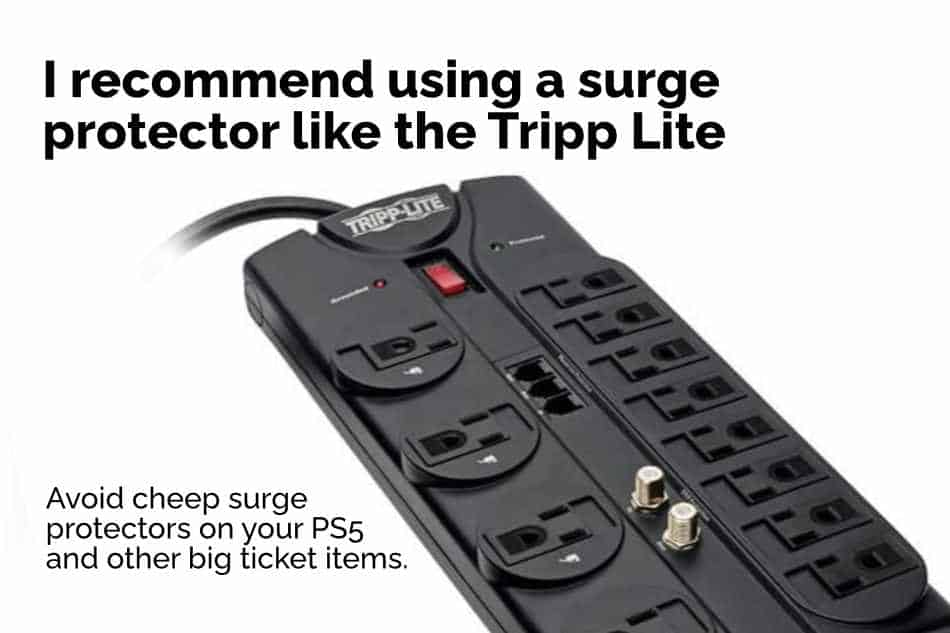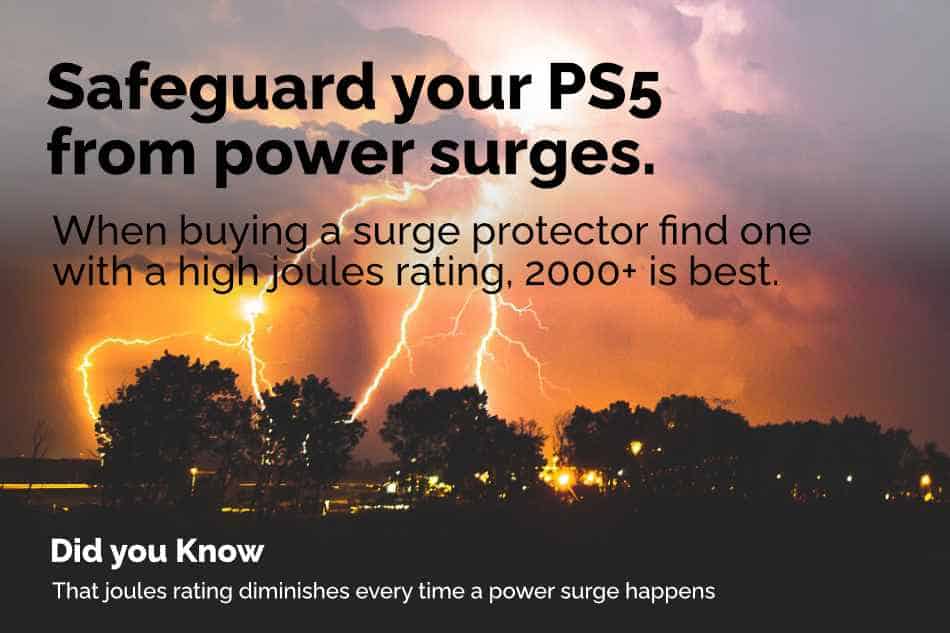A few years back, lightning struck the street across from my house, which caused a power surge.
The power surge fried my laptop, soundbar, TV, garage opener, newly bought PS4, and a few smaller electronics. The total damage caused was over $3000.
At the time, I used a standard power strip to juice up my electronics.
Most electronic warranties don’t cover power surges. I, therefore, had to replace the destroyed devices over several months because I didn’t have the money to do it all at once.
Not wanting to go through the pain of losing my complete entertainment system again, I now use a surge protector with all my electronics.
So, when a friend recently asked me whether they should use a surge protector with their spanking new PS5, I had a definitive answer to their question.
Should you use a surge protector with the PS5? Yes, always use a surge protector with your PS5. The surge protector will protect your PlayStation 5 from power surges, which can burn its plastic cover, strain its electrical components, causing them to wear out faster, or worse, zap its circuit board, leading to the total damage of your PS5.
Now that you know you should use a surge protector with your PS5, read on to find out how the device protects your PS5 and how to choose a surge protector to use with your console.
Is it safe to plug a PS5 into a surge protector?
Just like the Xbox Series X, the PS5 has a built-in surge protector.
Due to this, many PS5 gamers are asking if they should use an external surge protector with the console.
On gaming forums, there have been comments made that Sony recommends you don’t use a surge protector with their next-gen console because it will affect the power supply and performance.
I’ve had my PlayStation 5 plugged into a Tripp Lite TLP1208TELTV 12 Outlet Surge Protector for almost a year now, and I’ve never had an issue.

I have also read through the PS5 safety manual and couldn’t find anything that suggests using an external surge protector with the PS5 will damage it or affect its performance.
So, while you can plug your PS5 directly into a wall socket because of its in-built surge protector, I recommend you don’t. Plugging your PlayStation directly into a wall socket is similar to not wearing a safety belt in a speeding car.
As someone who’s had their PS4 fried because of not using a surge protector, I suggest you power the console using an external surge protector instead.
The double surge protection will give you peace of mind that your PS5 is well protected should a power surge occur.
How does a surge protector guard your PS5?
A surge protector has two main functions.
One, it allows you to connect multiple devices to a single power source, and most importantly, it protects your electronic devices from high voltage power surges.
A power surge occurs when there is a significant increase in designated voltage levels.
For example, in the US, they set the standard voltage at 120 volts. If the voltage goes above this, say to 130 volts, there is a problem.
A power surge can occur due to issues like bad weather, poor electrical wiring, downed power lines, and the use of high voltage devices like an air conditioner.
When a power surge happens, a surge protector detects it and ensures the extra voltage doesn’t get to your PlayStation 5 because if it does, it could permanently damage your console.
The surge protector prevents the extra voltage from destroying your PS5 or other electrical devices connected to it by diverting the electricity to its grounding wire.
A grounding wire runs parallel to neutral and hot wires, which carry acceptable voltage, and provides an outlet for excess current.
As the extra voltage is diverted, a safe current is delivered to whatever electrical devices are plugged into the surge protector.
Which surge protector should you use with your PS5?
If you’re shopping for a surge protector for your PlayStation 5, here are some tips to ensure you buy one that will keep your console safe.
Know the difference between a surge protector and a power strip
First, ensure the device you’re considering purchasing is a surge protector and not a power strip.
A power strip only provides extra outlets which can connect several devices to a single wall power source.
Apart from giving you extra outlets, a surge protector, which is a type of power strip, keeps your electronics safe from power surges.
Surge protectors and power strips have a strong resemblance, and it is not uncommon for people to confuse the two.
Check the device’s packaging to know if you’re looking at a surge protector or power strip.
A surge protector will have a joules rating on its box.
Check the joules rating
Joules measure energy and on a surge protector, they’ll tell you how long the device will safeguard your PS5 from power surges.
Purchase a surge protector with 2000+ joules for the best protection for your electronics.
The Tripp Lite TLP1208TELTV 12 Outlet Surge Protector, which I currently use with my PS5, has a rating of 2800 joules. I recommend you buy this surge protector from Amazon if you’re looking for a reliable protector for your PS5.
Note that joules rating diminishes every time a power surge happens. For example, one big power surge could use up all the joules in your protector and make it useless.
A quality protector like the Tripp Lite will shut off when its joules are below a safe level. When this happens, replace the surge protector.
If your surge protector doesn’t give you a warning that it can’t protect your PS5 any longer, plan to replace it every two years.

Avoid $10 surge protectors
A cheap surge protector is unlikely to offer you the protection you need to keep your PlayStation 5 safe.
So, keep away from surge protectors that are cheap as you could regret buying them.
Also, when buying a surge protector, check to see if it has a warranty. A cheap surge protector is unlikely to have one.
The Tripp Lite comes with a warranty that can replace your PS5 should something happen to the console during a power surge.

